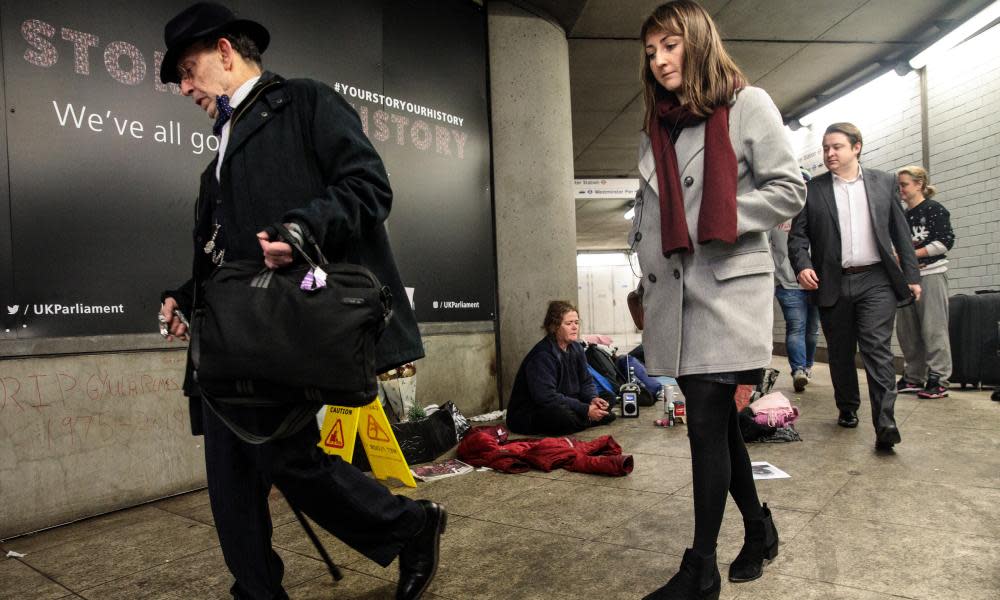Westminster council boards up area ‘to keep homeless people away’

Westminster council has boarded up an area in the London borough to keep away rough sleepers, with campaigners warning that local authorities and police are pushing homeless people “out of sight and out of mind”.
Large white hoarding has appeared outside McDonald’s in Victoria Street, which homeless people and campaigners say is part of a wider effort to remove rough sleepers from the borough with the largest street population in England.
Rough sleeping in London reached an all-time high of 8,855 people for the 2018-19 calendar year, an 18% annual increase. There were 5,529 new rough sleepers on London’s streets last year, equivalent to 15 people a day, more than a third of whom had lost private rented accommodation, according to the new figures from the Combined Homelessness and Information Network.
One homeless person in Westminster said: “They put it up to stop us sleeping there. They talk about antisocial behaviour but often that is not always linked to us.”
Westminster council confirmed it had put up the hoarding but said it had no “measures in public spaces specifically to deter rough sleepers”.
The councillor Ian Adams, the cabinet member for public protection and licensing, said the hoarding was a temporary measure while the local authority worked on longer-term designs for the location.
He said the structure had been put up in response to antisocial behaviour, which had left residents feeling “increasingly unsafe”.
He said the council had taken a balanced approach between “providing help for those in genuine need, as well as taking tough action on unacceptable criminal and antisocial behaviours”. He said additional outreach workers would be in the area to help rough sleepers access services and hostels.
But Stephen Robertson, the chief executive of The Big Issue Foundation, said it was important not to conflate antisocial behaviour with issues affecting homeless people.
“Criminalising or otherwise temporarily removing homeless people in order to improve the image of a city is not the solution … Excluding people from one space most often means they move elsewhere but the problem does not go away.”
A number of rough sleepers in Westminster tube station have been issued community protection notices (CPNs) by the police, threatening a maximum fine of £20,000. The orders are used alongside the 1824 Vagrancy Act, which criminalises begging and rough sleeping in England and Wales.
One homeless man, who asked to remain anonymous, was threatened with a penalty for “positioning himself for begging”. Another rough sleeper, who also wanted to be anonymous, was given a notice for “loitering” and was woken up and searched under the “terror code”.
The Metropolitan police said that in Westminster the police, council and outreach teams were working together to engage with people on the street and try to help them access services.
A spokesperson said: “It would be wrong of us to refuse to play our part in a partnership effort to prevent people sleeping rough on London’s streets. Where enforcement is required, the Met does have a duty to act.”
Sanctions can include arrests, cautions, warnings, penalty notices or CPNs. “Officers will assess what is proportionate in each circumstance,” the Met said.
But Rosie Brighouse, a lawyer at the human rights organisation Liberty, said using CPNs to give homeless people fines for being homeless is “cruel and counterproductive”. “It does nothing to deal with the underlying causes of homelessness and instead makes it more difficult for rough sleepers to improve their situation,” she said.
The government has been accused of driving those on the streets out from the underpasses next to the Houses of Parliament in Westminster, with a pass-activated gate now installed where rough sleepers used to stay.
Layla Moran, the Liberal Democrat MP for Oxford West and Abingdon, wrote to the House of Commons commission and serjeant at arms about the issue. She wrote: “After a homeless man was found dead in Westminster station … it concerns me that parliament is acting in this seemingly harsh manner … We must avoid an ‘out of sight, out of mind’ mentality.”
One homeless man said: “They have put the boarding up to stop us with a gate on … One workman said it is temporary and another said it is permanent but either way we just go through anyway.”
Parliament said the gate had been put up “to better manage the area for those entering the estate”.
This year it was reported that a group of homeless people had been forcibly removed from the public tunnels in that area. One man claimed he was told by a police officer that an MP had complained about their presence.
The issue of homelessness came into sharp focus after an homeless man, Gyula Remes, died in the underpass just outside the Houses of Parliament in December 2018.
A spokesperson from the Labour Homelessness Campaign said that, by working with the rough sleepers of Westminster, they had seen the constant official harassment people had been subjected to.
“They are not being offered the housing they need, and some are denied all support because of the government’s cruel hostile environment policies. On the steps of Westminster, MPs walk straight past the homelessness crisis they created, and now there is a concerted attempt to push rough sleepers out of sight and out of mind. ,” the spokesperson said.
Explaining the newly installed gate, a parliament spokesperson said: “We … have installed a pass-activated gate to better manage the area for those entering the estate. We continue to engage with partners on addressing the difficult issue of rough sleeping in and around the station constructively and sympathetically.”

 Yahoo News
Yahoo News 
